- English (EN)
- Español (ES)
- Português (BR)

Is Paraguay Safe? Crime Rates & Safety Report
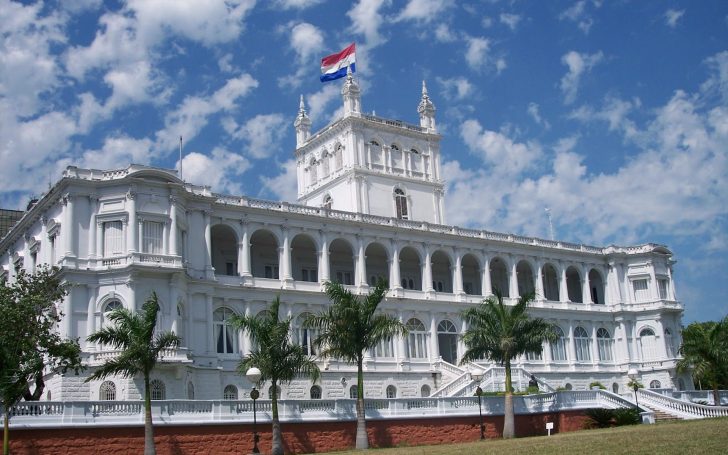
- Paraguay : Safety by City
Paraguay is a country located in South America that shares its borders with Argentina, Bolivia, and Brazil.
And even though it’s brimming with natural resources, being the world’s fifth-largest exporter of soya beans, having the world’s largest drinking water reservoir (Guarani Aquifer) beneath its grounds, and with the biggest hydroelectric producer—the Itaipú Dam—is on its border with Brazil, this country is still extremely poor.
It’s actually among the poorest countries in South America, which is why it’s filled with beggars, unemployed people, and petty criminals.
But Paraguay is nowhere near boring or worth skipping: it offers great historic and cultural value to everyone walking through the Asuncion city center, whose old, decaying buildings still show their old splendor and are proof of how beautiful Asuncion used to be.
At night, you can take a cab ride and enjoy its gorgeous lights, since it’s fully illuminated after dark.
You can enjoy its nightlife, its many bars, restaurants, and its vibrant, though dangerous, city spirit.
If you’re yearning for some nature, fear not – Paraguay offers safari rides through each eco-region of the country, and you can get acquainted with its fauna and flora with the help of trained safari guides.
- Warnings & Dangers in Paraguay
OVERALL RISK: MEDIUM
Paraguay is generally a safe country though it has its many dangers in the form of petty crime, violent crime, smuggling, money laundering, corrupt police, and many others. Just apply basic precaution measures and you should be fine.
TRANSPORT & TAXIS RISK: MEDIUM
Transport is not too reliable or safe in Paraguay. Avoid flashing mobile phones, wallets or other possessions, particularly if they're of value when out walking out of buses or simply riding public transport. There have been reports of pickpockets operating on buses. Keep in mind that taxi drivers will probably try to rip you off if unlicensed.
PICKPOCKETS RISK: HIGH
Most crime in Paraguay is not of a violent nature, and you should keep in mind that street crime such as pickpocketing, bag snatching, jewelry theft, and mugging very much exist, particularly in the cities. More serious crimes such as car theft, armed robbery, and home invasions exist in both urban and rural centers. Another form of petty crime are snatch and grabs by thieves on motorcycles, and sometimes victims are threatened with a weapon.
NATURAL DISASTERS RISK: MEDIUM
There are a couple of natural disasters that hit Paraguay regularly, including droughts, floods, and forest fires but there are also diseases such as yellow fever, and more recently the famous Zika outbreak, which why it's still not safe for pregnant women to travel to Paraguay.
MUGGING RISK: HIGH
Even though, as mentioned, the majority of crime on the streets of Paraguay is non-violent, violent crime is on an increase in crowded tourist areas in Asunción, Ciudad del Este, and Pedro Juan Caballero. If you wind up in a serious situation with a mugger, hand over everything immediately.
TERRORISM RISK: LOW
Even though there haven't been any terrorist attacks in Paraguay's recent history, they shouldn't be ruled out, so be aware of your surroundings at all times.
SCAMS RISK: HIGH
There are many scams in Paraguay, so be very careful. There are unauthorized ticket vendors, selling tickets for substandard or non-existent buses in the Asuncion bus terminal. If you happen to be roaming the streets and run into people playing card games and calling people to join in and make some "easy money", keep in mind that although the game seems lucrative, the guy is probably a scammer and other people participating are probably his buddies, so you have no chances of winning it.
WOMEN TRAVELERS RISK: MEDIUM
While Paraguay is definitely safer for solo female travelers than much of its other neighbors, it's still recommended that you don't wander around without company, whether during night or day. Use your common sense and have your wits with you. Avoid poorly lit and deserted areas at night and finding yourself in places filled with drunken people. If you're pregnant, keep in mind that Paraguay was an affected area of the Zika outbreak.
- So... How Safe Is Paraguay Really?
Taking into account the reputation of the countries surrounding Paraguay, and the fact that this is one of the poorest countries in the region, it’s actually much safer than you would expect.
There are three large cities in Paraguay, and all three of them are safer than their equivalents in size in the countries surrounding Paraguay.
Rio de Janeiro, Buenos Aires, and São Paulo are all far more dangerous than major cities in Paraguay.
Though petty crime exists, you are unlikely to get into trouble with the muggers, robbers or end up in a violent incident.
It is important that you carry some sort of identification with you, as the police have a tendency to stop tourists at random.
You may even expect a situation where they expect you to give them some money as some sort of a bribe to allow you to move on.
Women should be careful if they’re walking unaccompanied and should avoid going out alone at night, but generally, applying the same safety rules as they would in their own countries will probably suffice.
A city with a somewhat shady reputation is Ciudad del Este, located on Paraguay’s eastern border with Brazil, and it is actually known as a location where activities such as smuggling, money laundering, and counterfeiting take place.
These activities, however, have nothing to do with tourists so you shouldn’t worry about visiting this city.
Just be wary of pickpockets, and various schemes and tactics that criminals might try in order to steal your bags or wallets.
- How Does Paraguay Compare?
- Useful Information
Most countries do need a visa in order to enter Paraguay, and there are some that are exempt from visa requirements, like all European Union citizens and citizens of other South American countries. Make sure your passport is valid for a minimum of 6 months after your travel dates. If you are not sure about your visa status, visit www.doyouneedvisa.com which will let you know whether or not you need a visa based on your nationality and the country you want to visit.
Paraguayan guaraní is the official currency in Paraguay. ATMs in major cities and towns usually work with Visa, MasterCard and Cirrus networks.
Paraguay has a subtropical climate in the Paranaense region and a tropical climate in the Chaco. The subtropical climate in the Paranaense region is characterized by a humid climate, with plenty of precipitation all year round. Temperatures in Chaco are usually high, dropping only slightly in winter.
Silvio Pettirossi International Airport is Paraguay's main international gateway. It is located at Luque, serving the capital city, Asunción.
Travel Insurance
Just like anywhere else, we advise getting travel insurance when traveling to Paraguay, because it would cover not only medical problems but also theft and loss of valuables.
Paraguay Weather Averages (Temperatures)
- Average High/Low Temperature
Paraguay - Safety by City
- Where to Next?

4 Reviews on Paraguay
I wish i could go to paraguay .could you please help . [email protected] my email thanks ..
Lovely information .
UmMm I’m not sure it’s wise to give your email address on a public site ;-;
Lovely place ❤️ I wish if I could be there!
These days organized crime are taking over. Corruption is everywhere. Police officers are eager to get your money for any reason made up. Do not recommend to visit the country.
Share Your Experience Cancel reply
Your Review
Title of your review
Article Contents
- Overall Risk
- Transport & Taxis Risk
- Pickpockets Risk
- Natural Disasters Risk
- Mugging Risk
- Terrorism Risk
- Women Travelers Risk
- Weather Averages (Temperatures)
- User Reviews
- Share Your Experience
Popular Destinations

Safety Index
Recent reviews & comments.
- Lois on Nigeria
- Louis Baldwin on Santa Fe
- Cedrick Dubs on Rochester
- Keeno Depp on Gardiner
- Liam Watson on Gardiner
Popular US States
- Pennsylvania

Is Paraguay safe? 2024 Travel Guide
Welcome to our Paraguay safety guide.
Although it’s the real heart of South America (both geographically and also culturally with its own unique scenes), Paraguay remains a mystery to most travelers who don’t end up visiting.
However with the best preserved Jesuit ruins in all of Latin America , expansive lands of the Chaco as well as the indigenous Guaraní culture, Paraguay is a real eye-opener .
Paraguay Quick Summary:
- 📍 Where is it: South America
- 🗺 Difficulty Getting There: Moderate
- ⏱ Time needed: 1 Week
- ☀️ Best Time to Visit: February/March
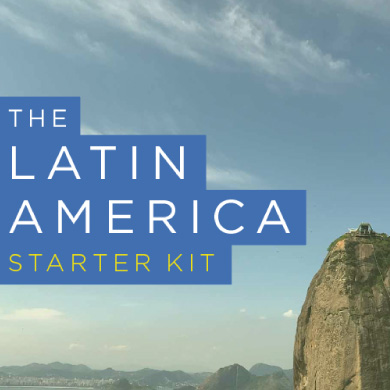
What's in this guide?
Is Paraguay safe?
In this comprehensive guide, we’ll explore everything you’ll need to know about Safety in Paraguay as a backpacker or traveler .
We’ll look at all the different factors, our top safety tips, other useful information as well as an FAQ section where we answer your key questions.
We would advise any travelers who are thinking of heading to Paraguay to prepare properly before arriving, and to get in touch with us where we can offer more guidance.
Is Paraguay Safe Right Now?
Quick Answer: Yes – Paraguay remains one of the safest countries you can visit in South America, however it still comes with its own risks. Areas like Encarnación, the Chaco (with a tour of course) and parts of Asunción are really safe for travelers, who can explore both during the day and night alone without having to worry.
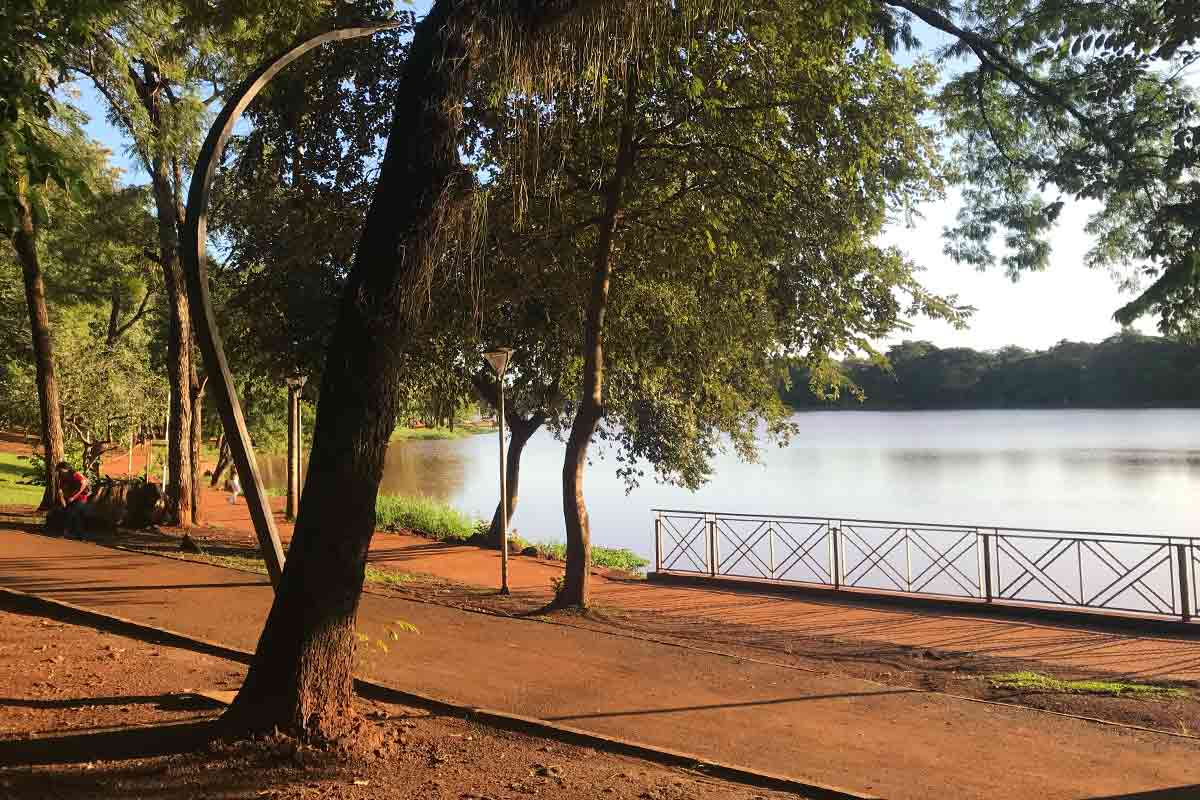
However there are some areas that will need to be treated with caution, such as Ciudad del Este and areas of Asunción (such as Dr. Ricardo Brugada) which are best avoided given the high levels of poverty and increasingly reckless attempts of theft and other crimes. We’ll explore these issues and how to stay safe as we continue in this guide.
Paraguay Travel Warnings
The main travel warning is for the borders with Brazil , Argentina and Bolivia , given there’s lots of drug trafficking activity (and associated violence) in these areas. Given the vast majority of travelers cross into Paraguay via these land borders, it’s something you’ll need to keep in mind when you enter and to keep your guard up .
Armed robbery (usually on motorcycles) is a big risk in the bigger cities like Ciudad del Este and Asunción, so avoid walking out with your phone and keeping anything valuable either in your accommodation or stored safely in a secure Money Belt or the nearest equivalent.
Your biggest worry here will be hygiene . Many parts of Paraguay are very poor and lack any kind of safety standards, which can increase the risk of getting sick. Always avoid eating unwashed fruits, make sure meats are well cooked as well as only drinking sealed bottled water.
Where to Stay in Paraguay
Asunción – The area of Catedral is one of the safest for tourists, which also has many worthwhile sites to visit. The Nomada Hostel is our favourite in the capital (and in all of Paraguay!). This is because of the friendly staff, perfect location as well as having an on-site swimming pool.
Encarnación – The whole city is pretty safe, although the area of San Blas is our personal choice for a stay. Here you can stay at The Mandala Hotel , who offer sleek private rooms for a good rate. As well as offering an on-site bar, you’ll also be close to the Plaza de Armas and main city beach.
Ciudad del Este – Area 1 (as it’s known locally) is the safest area to stay in Ciudad del Este, which has a more residential feel. The Hummingbird Hostel is best for those on a budget, where you’ll be just a few blocks from the Lago de la República. Those After a more deluxe experience will want to stay at the nearby Central Park CDE , who offer more comfortable, private rooms.
Things to do in Paraguay
Although it’s not on the hot tourist trail like other South American nations (given it lacks wonders such as Machu Picchu or Patagonia), there’s still many incredible things to see when in Paraguay.
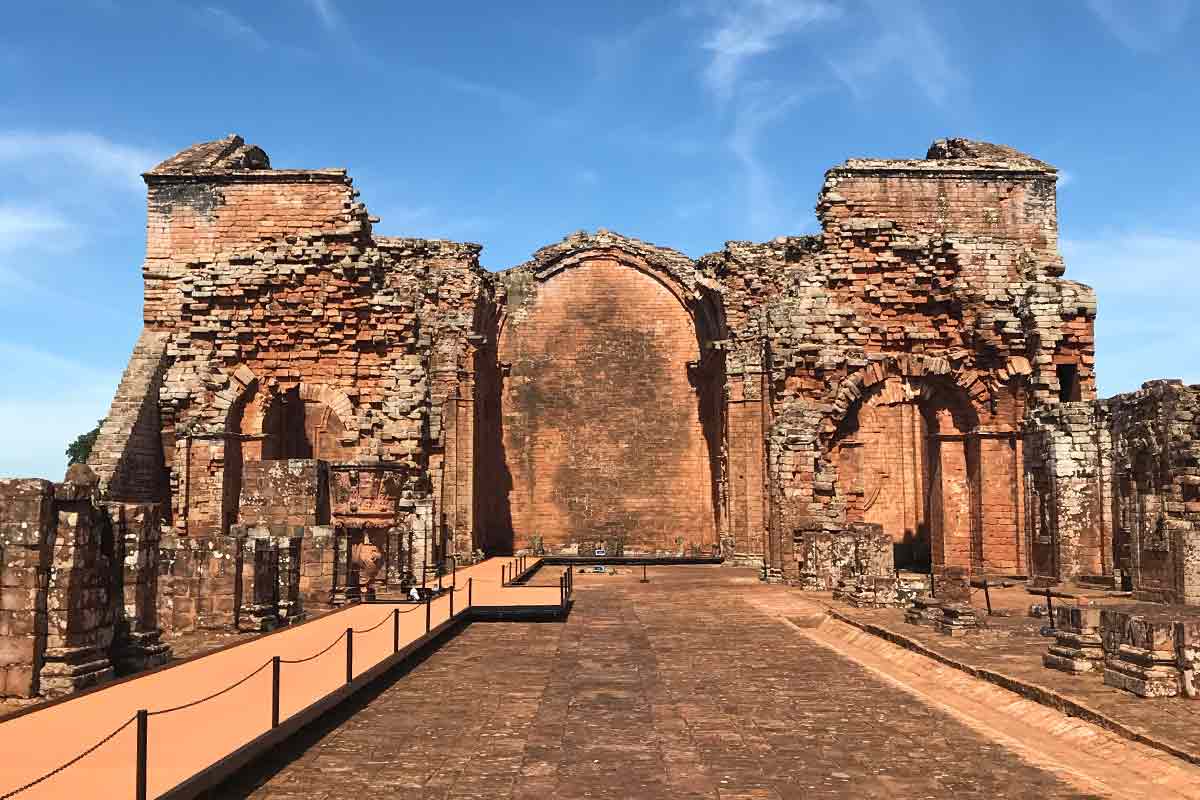
The Jesuit Mission Ruins here are a prime example, and are the oldest of their kind in all of Latin America. There’s two particularly good sites which are located close to Encarnación, which are La Santisima Trinidad de Paraná and Jesus de Tavarangüe where we’ll see crumbling temples which were once home to the ancient Guaraní people (natives who still live in Paraguay to this day).
Paraguay is also home to some really breathtaking nature. El Chaco is the best area to visit, which is located in the untouched west of the country, and covers over 60% of the entire nation! You can head on a multi-day adventure tour here, where you can see rare biomes and animals such as Pink Armadillos , Jaguars, Howler Monkeys and various endemic bird species.
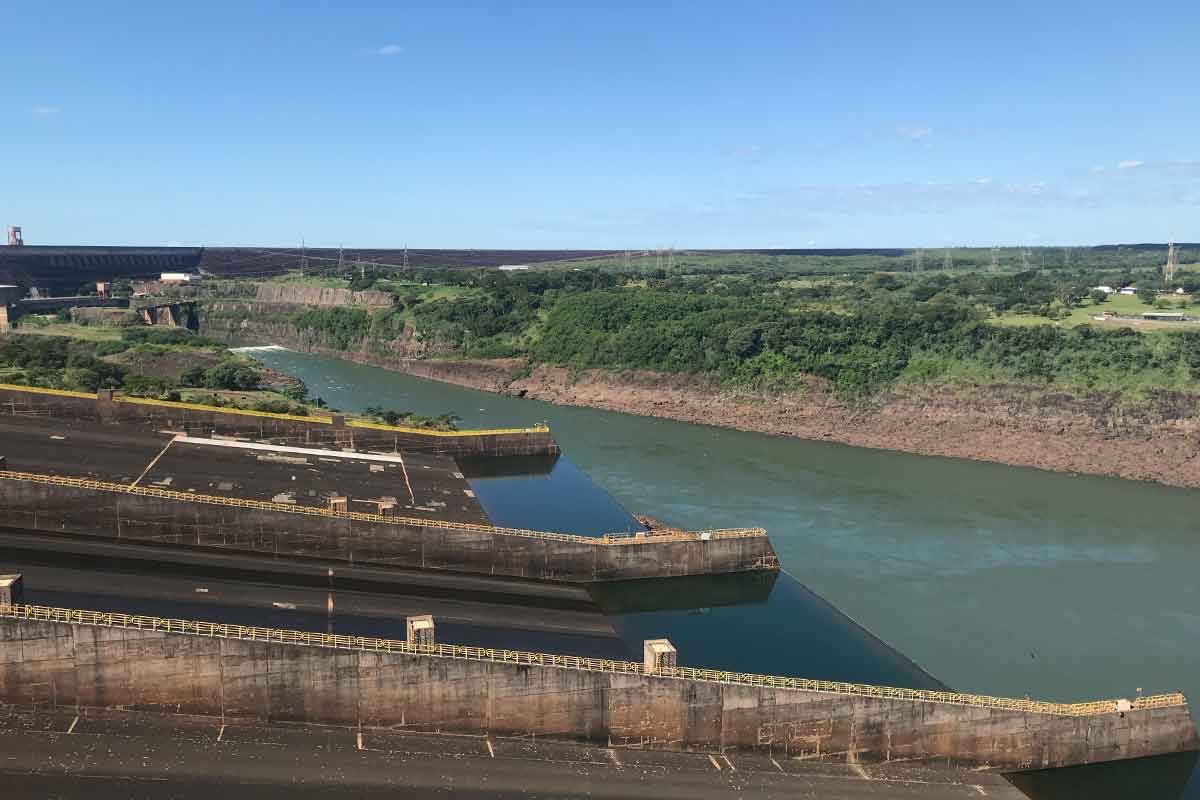
The cities of Paraguay also have some unique, smaller attractions to visit too. Near to Ciudad del Este we can find the Itaipu Dam, which is the most powerful of its kind on earth and serves Paraguay with over 70% of its electrical needs. In Asunción there’s various palaces and the panteón for history buffs, which you can see with all within one day with this fully-customisable tour , whilst beach lovers can even chill out on the man-made beaches in Encarnación!
Is Paraguay Safe to visit?
Below we’ll take a look at the current safety situation in Paraguay.
Crime in Paraguay
When comparing all South American countries, Paraguay is actually among the safest of them all (along with Uruguay, Chile and Argentina).
This is most prevalent in the smaller towns as well as the city of Encarnación, which are mostly safe to walk around both during the day and night (of course there’s always some dodgy areas, so it’s best to seek guidance from locals wherever you go).
There is however still a risk of petty theft such as pickpocketing and car jacking, which usually happens in the rougher neighbourhoods (on the contrary, the Plaza de Armas in Encarnación is a safe area where this rarely happens).
Most issues usually happen in the big cities of Ciudad del Este and Asunción. Ciudad del Este in particular is the worst, given it’s a major drug smuggling route as well as having high levels of poverty. You can walk around during the day, however at night it’s a completely different story .
Asunción is safe in certain areas such as Catedral, where you can walk freely during the day. At night it’s not so bad, however it’s better to use Uber when heading longer distances (especially to the built-up district of Las Mercedes, where the areas in-between aren’t particularly safe).
According to data collected by Numbeo, Paraguay scored 50.56 on the crime index (0 being the safest whilst 100 the most dangerous). For reference, Peru scored 67.51 whilst Uruguay scored 51.92.
What parts of Paraguay are safe?
The safest areas for tourists to visit in Paraguay are Encarnación , San Lorenzo and Asunción (Catedral and Las Mercedes districts).
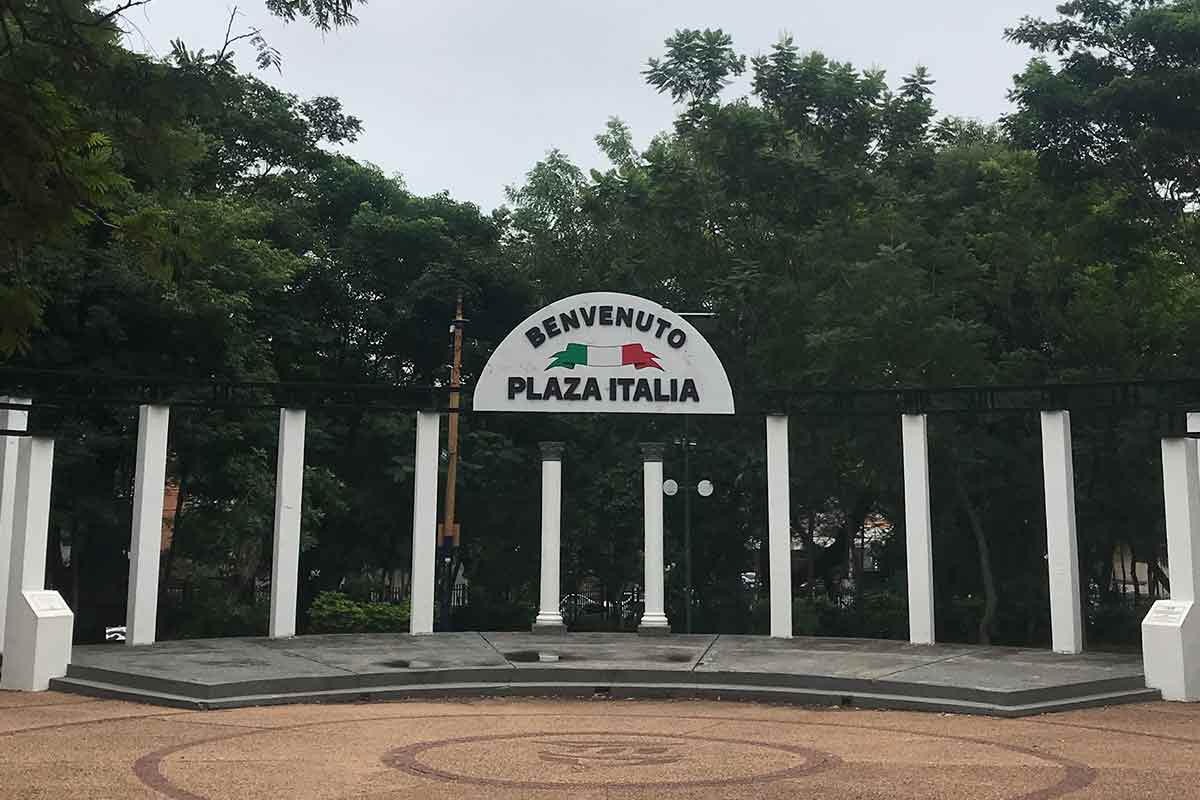
You can easily walk around by yourself during the day without issues, although it’s still best to keep valuables locked up at home (especially if heading into markets or unknown neighbourhoods).
Just remember that many parts of Paraguay are still very poor, and for this reason it’s best to dress down (not only for respect, but also to avoid making yourself a target by drawing too much attention to yourself).
Paraguay Safety at Night
Again, areas in Encarnación and San Lorenzo are great for heading out at night, where it feels safe in the main touristy areas.
When in Asunción you can easily explore alone or party in the evening, however only in the areas of Las Mercedes and Catedral . Anywhere else can feel rougher and not so safe, especially since tourists can be targeted for theft.
Ciudad del Este is another kettle of fish, which of course divides tourists on either side. The only real safe area to walk around during the evening is Area 1, which is located west of the Lago de la República. There’s also some nice nightlife here, and you can have a good time if you follow our precautions.
Got travel insurance for Paraguay?

7 Safety Tips for Paraguay
Below we will list 7 of our top safety tips for when heading to Paraguay.
1. Dress Down
Much of Paraguay is still very poor, and you’ll feel this especially when traveling in from bordering Chile or Argentina. Aside from being more humble and respectful, dressing down will also help you avoid getting robbed or assaulted . Of course if going out for the night and using taxis then you’re fine to dress how you want, but this tip is more for when heading out during the day, visiting public markets etc.
2. Only Drink Bottled Water
As with pretty much every other country in Latin America, the water systems aren’t exactly known for their reliability here in Paraguay. Showering or washing clothes is absolutely fine, however when drinking you’ll only want to stick to sealed bottles of water which are safe for consumption. Even a reliable water purifier like this one is suitable. Otherwise you can get really ill from drinking tap water, and at best spend a few days hunched over the toilet.
3. Head with Reliable Tours when Exploring Further Afield
Travelers who are looking to explore wild regions such as the Chaco will need to go with a tour. Whilst there are many local companies, they can be quite hit or miss when it comes to reliability, or even following usual safety procedures. We instead recommend heading with this memorable multi-day tour , where you’ll have a professional guide take you around the best spots…
4. Use Ubers in the Major Cities
Uber is active in all major areas of Paraguay, including those of Ciudad del Este, Asunción and Encarnación. Whilst street smart travelers will be fine using public transport, it’s pretty hectic to say the least with many irregular stops (as well as having its own safety risks). Uber is much quicker and more efficient, with prices not being too bad on the wallet either. If you’re going to use public transport, just remember to dress down a bit and keep valuables in your front pockets.
5. Avoid Walking with your Phone Out
Whilst violent crime against tourists is rare in Paraguay, sometimes theft can be acted out with some serious threats (such as criminals on motorcycles who have a gun or knife on them). They usually spot targets either with a phone or something as valuable out in plane view , so don’t do it! If you need to check something (or are lost), then head into a local shop and check inconspicuously.
6. Get Travel Insurance before Arriving
7. Be Sure to get Necessary Vaccinations for Paraguay
Hygiene isn’t Paraguay’s strongest point (although we do hate to generalise the whole country, since some areas are doing a great job). This is especially so in the busy markets and less developed towns and cities. You’ll want to get your usual boosts like Typhoid and Hepatitis A. There’s also a risk of Yellow Fever and Chikunguyna too which are spread by mosquitoes, so be sure to bring some quality mosquito repellant with you too. As always consult with your doctor to know exactly what you’ll need before visiting.

Paraguay Safety FAQ Guide:
Is paraguay safe for solo female travelers.
Yes, Solo Female Travelers can explore Paraguay and have both a safe and memorable time here. Just make sure to stay in the safer areas (especially in Ciudad del Este and Asunción), and to avoid accepting drinks from random strangers (there have previously been incidents of drinks or even food being laced with drugs).
Is Asunción worth visiting?
Most travel sites are pretty underwhelming when it comes to the capital of Paraguay (when compared with others), however I (George) have actually been and can say it’s a really nice delight. As well as being full of historical landmarks and the native Guaraní who live amongst locals, you can also enjoy the nightlife and vibes in the built-up neighbourhood of Las Mercedes.
Is Ciudad del Este safe?
Whilst not as dangerous as cities in Brazil or even Colombia, Ciudad del Este definitely feels more grimey (no surprise here since it’s home to the largest illicit market on earth!). Give everyone’s here to save bucks, it does make it less safe given some criminals will try to take advantage of local tourists. Again follow our tips in this guide and you’ll have no issues.
Is Paraguay safer than Mexico for tourists?
Is paraguay safe final words.
And that’s all for our guide on how to stay safe in Paraguay.
Whilst not the most visited country in Latin America, Paraguay offers a really unique gateway into the real life and culture of this continent (no over-touristy parts here!). Here in Paraguay we can interact with the ancient Guaraní people who still live here to this day alongside the Paraguayans, as well as visiting many of the ancient sites they once built.
This country is also really safe for a visit too. With some solid preparation you can easily explore both the cities and more remote areas without an issue. Even if you do end up staying for just a short time (like most do), it’ll be a really memorable stint along your longer South America backpacking trip .
In this guide, we’ve explored the current safety situation in Paraguay , which includes the areas to avoid, as well as any current travel advisories. As well as looking at the best things to do in Paraguay, we’ve also included our FAQ which answers your most burning questions.
While you’re still here, be sure to read our backpacking Paraguay Itinerary for more tips and travel inspiration.
👉🏽 P.S. If you’ve found this guide helpful, buy us a coffee here to say thanks! Or, support us by downloading our South America Travel Bible to get our best content.
“ Dear traveler! Some links in this post contain affiliate links. Meaning, if you click through and make a purchase, book a hostel or sign up for a tour, we may earn a small commission at no additional cost to you . Your support means a lot and helps us to carry on traveling and maintaining the quality of this site for you.”
Similar Posts
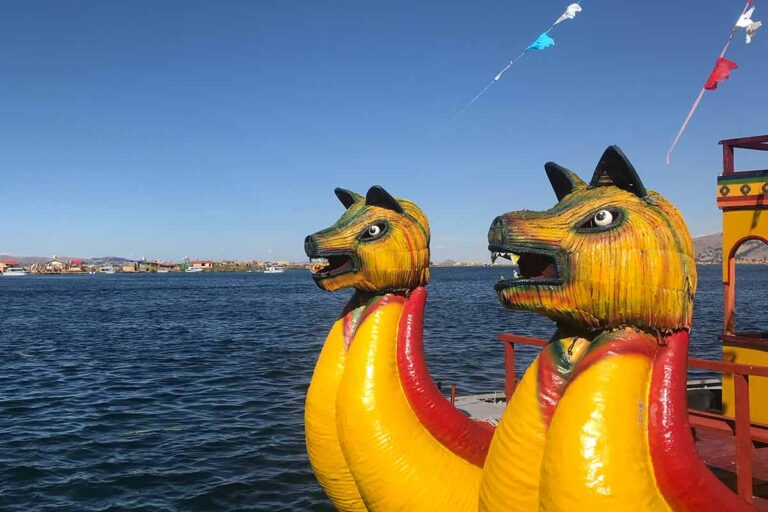
How to get from Cusco to Lake Titicaca
Are you looking for the best way to get from Cusco to Lake Titicaca? Lake Titicaca is a really surreal place. Straddling both Peru and Bolivia, it’s the highest-altitude navigable lake on the globe and is known for its diverse range of stunning islands. Amongst these we can find the floating Uros Islands which are…
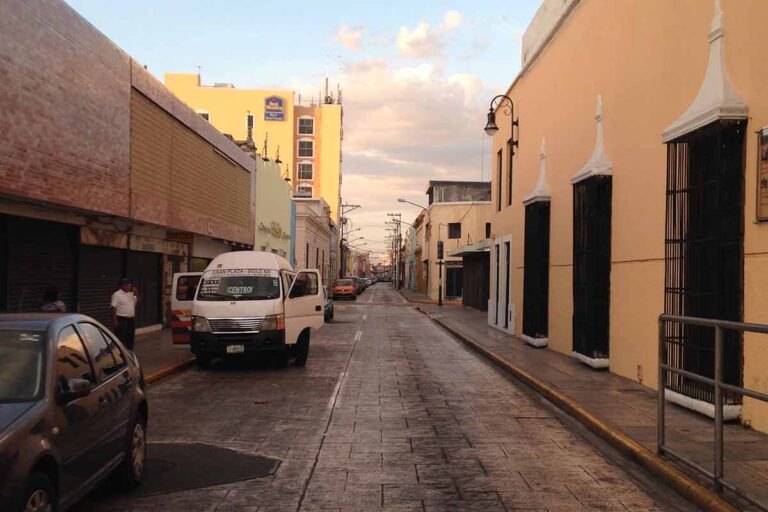
Is Merida safe? 2024 Travel Guide
Welcome to our Merida safety guide. This epic city is a must-visit when in the Yucatán region, known for both its beautiful buildings and ancient Mayan culture. You could easily spend weeks at a time here seeing both the city highlights, and also heading on numerous days trips to both the nearby cenotes and ancient…
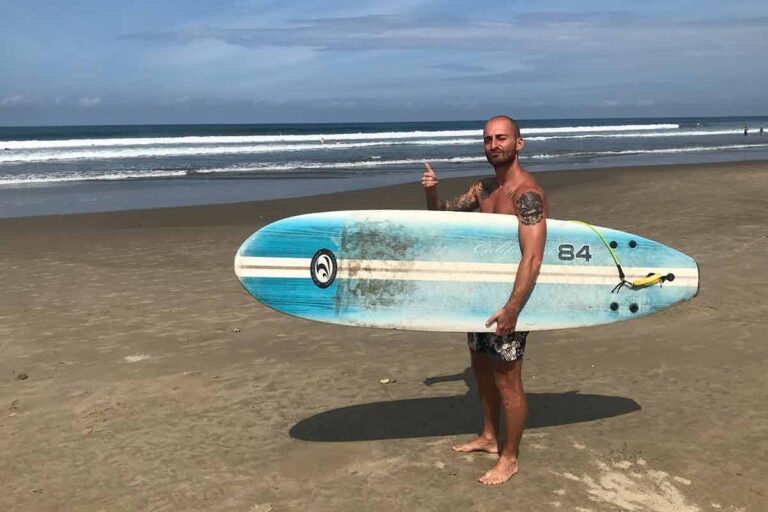
10 days in Ecuador Itinerary
Many tend to skip Ecuador whilst traveling through the continent, and we think this can end up being a really big regret. The perfect gateway between Colombia and Peru, here you’ll visit beautiful cities such as Cuenca and Quito, chill Pacific beach towns as well as impressive jungle landscapes. Given Ecuador is quite small, you…
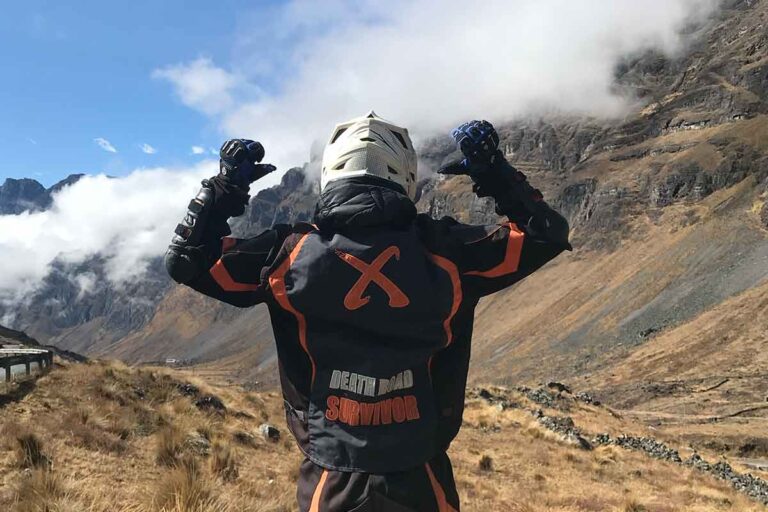
Traveling to Latin America Bucket List: My Top 20 Experiences
Welcome to this traveling to Latin America Bucket List: My Top 20 Experiences! Rounding off the year, it’s always a good time to reflect on everything we’ve got up to, and to appreciate the different experiences we’ve been able to have. Travel has been at the core of what I’ve done this year, so naturally,…
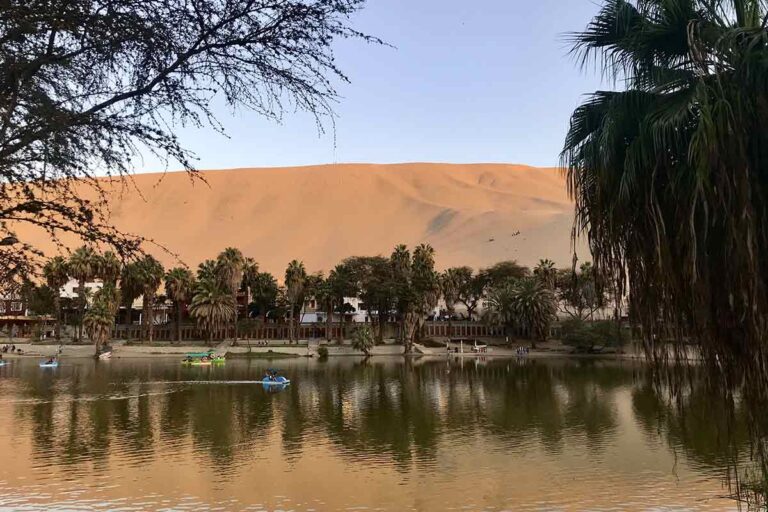
Huacachina, Peru Travel Guide
Located in the arid region of Ica, Huacachina, Peru is famous for its giant dunes that surround the small town. It’s been described by many travelers as a true desert oasis, with its picturesque lake sitting in the middle. As a result, Huacachina has since become one of the most popular photo ops destinations in…
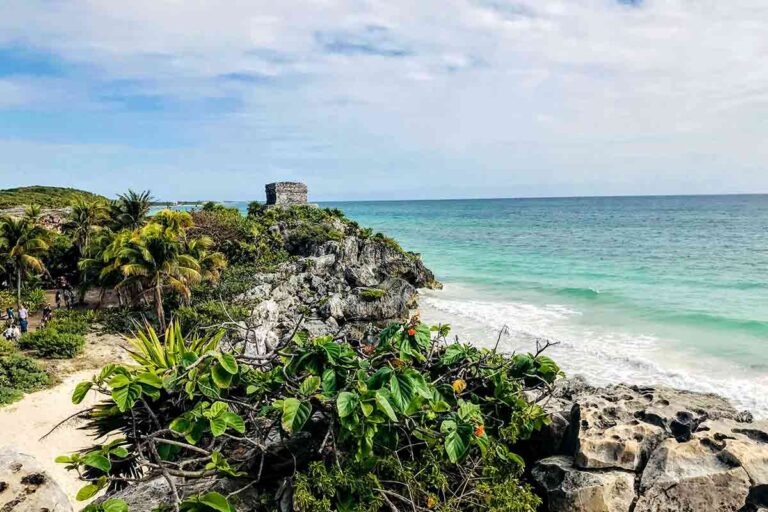
Is the Riviera Maya safe?
Welcome to our Riviera Maya safety guide. One of the most popular regions you can visit in Mexico, the Riviera Maya really has it all. Here you can spend the early morning exploring ancient Mayan ruins, followed by chilling in a picturesque cenote, and then heading to the beach in the mid-afternoon. And that’s all…
2024 U.S. Election September 23, 2024
Returning your absentee ballot from overseas, notice october 4, 2024, crisis support for u.s. citizens in lebanon.
- Travel Advisories |
- Contact Us |
- MyTravelGov |
Find U.S. Embassies & Consulates
Travel.state.gov, congressional liaison, special issuance agency, u.s. passports, international travel, intercountry adoption, international parental child abduction, records and authentications, popular links, travel advisories, mytravelgov, stay connected, legal resources, legal information, info for u.s. law enforcement, replace or certify documents.
Before You Go
Learn About Your Destination
While Abroad
Emergencies
Share this page:
Travel Advisory July 17, 2023
Paraguay - level 1: exercise normal precautions.
Reissued with obsolete COVID-19 page links removed.
Exercise normal precautions in Paraguay. Some areas have increased crime risk. Read the entire Travel Advisory.
Exercise increased caution in:
- Amambay, Alto Paraná, Canindeyu, San Pedro, and Concepcion departments due to crime .
Read the country information page for additional information on travel to Paraguay.
If you decide to travel to Paraguay:
- Enroll in the Smart Traveler Enrollment Program (STEP) to receive Alerts and make it easier to locate you in an emergency.
- Follow the Department of State on Facebook and Twitter .
- Review the Country Security Report for Paraguay.
- Prepare a contingency plan for emergency situations. Review the Traveler’s Checklist .
- Visit the CDC page for the latest Travel Health Information related to your travel.
Departments of Amambay, Alto Paraná, Canindeyu, San Pedro, and Concepcion – Level 2: Exercise Increased Caution
Transnational criminal elements are active and engage in illicit trafficking of arms, narcotics, and goods in these departments, which are located along Paraguay’s northeastern border with Brazil. Police presence is limited.
U.S. government personnel must provide advance notice when traveling to these areas.
Embassy Messages
View Alerts and Messages Archive
Quick Facts
Must be valid at time of entry
One requested for entry stamp
Required, proof of yellow fever vaccination if you are traveling from a country with risk of yellow fever (this does not include the U.S. - for complete list, see Countries with risk of yellow fever virus (YFV) transmission
Embassies and Consulates
U.s. embassy asuncion.
1776 Mariscal Lopez Avenue Asunción, Paraguay Telephone: +(595)(21) 213-715 Emergency After-Hours Telephone: +(595)(21) 229-581 Fax: +(595)(21) 228-603 Email: [email protected]
Destination Description
Learn about the U.S. relationship to countries around the world.
Entry, Exit and Visa Requirements
U.S. citizens need a valid passport to enter Paraguay. U.S. citizens with expired or damaged passports may not be allowed to enter and could be sent back to the United States at their own expense. Private U.S. citizens do not need a visa for stays of up to 90 days for tourism or business. Some minor children need a special notarized authorization from Paraguayan authorities to enter and exit the country when not accompanied by both legal parents/guardians. Please visit the Embassy’s website for more specifics about whether this applies to your situation.
To leave Paraguay by air, you must pay an airport departure tax. Some airlines include the Paraguayan airport departure tax in the cost of the airline ticket. It is recommended that you check with the airline in order to determine whether or not the departure tax has been included.
Visit the Embassy of Paraguay website for the most current visa information.
HIV/AIDS restrictions: The U.S. Department of State is unaware of any HIV/AIDS entry restrictions for visitors to or foreign residents of Paraguay.
Find information on dual nationality , prevention of international child abduction and customs regulations on our websites.
Safety and Security
Security Messages: Messages regarding demonstrations, strikes, and weather-related events are posted on the Embassy’s website .
Terrorism: The U.S. Embassy is not aware of any specific threat to U.S. citizens in Paraguay. Nevertheless, you should remain vigilant at all times while travelling.
Crime: Transnational criminal organizations facilitate the illicit trafficking of arms, narcotics, and other goods in Paraguay, particularly along Paraguay’s eastern border with Brazil, most prominently from Pedro Juan Caballero south to Ciudad del Este, including the Tri-Border Area of Paraguay, Brazil, and Argentina. Coupled with the lack of sufficient police enforcement, the involvement of these organizations heightens violent crime in these areas. The U.S. Embassy in Asuncion requires U.S. government personnel and their family members to provide advance notice and a travel itinerary when traveling outside of the capital, particularly when traveling to Ciudad del Este, or to the departments of Alto Parana, San Pedro, Concepcion, Amambay, and Canindeyu.
U.S. citizens visiting or residing in Paraguay should also avoid large gatherings or events where crowds have congregated to demonstrate, protest, or cause damage as a byproduct of celebrating an event, such as after soccer matches.
Street crime is prevalent in the cities and the number of pickpockets and armed assaults is increasing. Robbers are more regularly using motorcycles to approach victims with a weapon and demand a wallet or purse, before quickly fleeing.
Thieves have been known to pose as service people (e.g., mailmen, reporters, water meter readers, electrical repairmen, delivery persons, maintenance personnel) to gain access to homes. They sometimes wear uniforms and travel in vans and automobiles with markings that make the vehicle appear official. Do not let such people inside your home unless you have contacted the service provider directly to verify the appointment.
See the Department of State and the FBI pages for information on scams.
Victims of Crime:
- U.S. citizen victims of sexual assault should first contact the U.S. Embassy.
- Report crimes to the local police at 911 and contact the U.S. Embassy at (+595) 021-213-715 and press 2210 (Dial (+595) (21) 229 581 after hours).
- Remember that local authorities are responsible for investigating and prosecuting the crime.
See our webpage on help for U.S. victims of crime overseas .
- help you find appropriate medical care
- assist you in reporting a crime to the police
- contact relatives or friends with your written consent
- explain the local criminal justice process in general terms
- provide a list of local attorneys
- provide information on victim’s compensation programs in the United States
- provide an emergency loan for repatriation to the United States and/or limited medical support in cases of destitution
- help you find accommodation and arrange flights home
- replace a stolen or lost passport
Domestic Violence: U.S. citizen victims of domestic violence may contact the Embassy for assistance.
Tourism: The tourism industry is unevenly regulated, and safety inspections for equipment and facilities do not commonly occur. Hazardous areas/activities are not always identified with appropriate signage, and staff may not be trained or certified either by the host government or by recognized authorities in the field. In the event of an injury, appropriate medical treatment is typically available only in/near major cities. First responders are generally unable to access areas outside of major cities and to provide urgent medical treatment. U.S. citizens are encouraged to purchase medical evacuation insurance .
Local Laws & Special Circumstances
Criminal Penalties: You are subject to local laws. If you violate local laws, even unknowingly, you may be expelled, arrested, or imprisoned. Penalties for possessing, using, or trafficking in illegal drugs in Paraguay are severe, and convicted offenders can expect long jail sentences and heavy fines. Additionally, it is not uncommon for individuals detained on drug-related charges to spend extended periods in detention before trial. Furthermore, some laws are also prosecutable in the United States, regardless of local law. For examples, see our website on crimes against minors abroad and the Department of Justice website. Arrest Notification: If you are arrested or detained, ask police or prison officials to notify the U.S. Embassy immediately. See our webpage for further information. Faith-Based Travelers: See the Department of State’s International Religious Freedom Report .
LGBTI Travelers: There are no legal restrictions on same-sex sexual relations or the organization of LGBTI events in Paraguay. See our LGBTI Travel Information page and section 6 of our Human Rights Report for further details. Travelers Who Require Accessibility Assistance: Paraguayan law prohibits discrimination against persons with physical and mental disabilities in employment, education, access to health care, and the provision of state services, and the government seeks to enforce these prohibitions. Nonetheless, access to buildings, pedestrian paths, and transportation is extremely difficult for persons with disabilities, as mandated accessibility requirements are rarely enforced.
Students: See our Students Abroad page and FBI travel tips .
Women Travelers: See our travel tips for Women Travelers .
We do not pay medical bills. Be aware that U.S. Medicare does not apply overseas.
Medical Insurance: Make sure your health insurance plan provides coverage overseas. Most care providers overseas only accept cash payments. See our webpage for more information on insurance coverage overseas. We strongly recommend supplemental insurance to cover medical evacuation. If traveling with prescription medication, check with the government of Paraguay to ensure the medication is legal in Paraguay. Always carry your prescription medication in original packaging with your doctor-issued written prescription.
The following diseases are prevalent:
- Diarrheal illness
- Dengue Fever
- Chikungunya
Vaccinations: Be up-to-date on all vaccinations recommended by the U.S. Centers for Disease Control and Prevention.
Further health information:
- World Health Organization
- U.S. Centers for Disease Control and Prevention (CDC)
Travel and Transportation
Road Conditions and Safety: U.S. citizens have been injured and killed in traffic accidents throughout Paraguay. Only minimal standards must be met to obtain a Paraguayan driver’s license, and a driver’s education prior to licensing is not common. Traffic Laws: Drivers throughout Paraguay routinely ignore traffic regulations. No vehicle insurance is required, and many Paraguayans drive without insurance coverage. Public Transportation: Public transportation is readily available for urban and intercity travel. Buses vary in maintenance conditions and may not meet U.S. safety standards. Taxis are available and may be called using telephone numbers listed in newspapers. Mobile ride hailing services are also available in the capital area. No passenger train service exists. Bicycle travel may not be safe because of traffic and other road hazards. Most urban streets consist of cobblestones over dirt. Nearly all rural roads are unpaved and may be impassable during rainy periods and the rainy season (November-April). Driving or traveling at night is not advisable outside of Asuncion, due to the presence of pedestrians, animals, or vehicles without proper lighting on the roads. See our Road Safety page for more information. Visit the website of Paraguay’s national tourist office and national authority responsible for road safety. The Touring and Automobile Club provides some roadside assistance to its members . The club may be contacted in Asuncion by visiting its offices at 25 de Mayo near Avenida Brazil or by calling 210-550 to 210-553. Intercity highway maintenance is not equal to U.S. standards. The privately maintained toll road between Caaguazu and Ciudad del Este and the routes between Asuncion and Encarnacion and Asuncion and Pedro Juan Caballero are generally in good condition. The Trans-Chaco route is in fair condition except for the portion between Mariscal Estigarribia and the Bolivian border, which is unpaved and at times impassable. Aviation Safety Oversight: As there is no direct commercial air service to the United States by carriers registered in Paraguay, the U.S. Federal Aviation Administration (FAA) has not assessed the government of Paraguay’s Civil Aviation Authority for compliance with International Civil Aviation Organization (ICAO) aviation safety standards. Further information may be found on the FAA’s safety assessment page .
For additional travel information
- Enroll in the Smart Traveler Enrollment Program (STEP) to receive security messages and make it easier to locate you in an emergency.
- Call us in Washington, D.C. at 1-888-407-4747 (toll-free in the United States and Canada) or 1-202-501-4444 (from all other countries) from 8:00 a.m. to 8:00 p.m., Eastern Standard Time, Monday through Friday (except U.S. federal holidays).
- See the State Department’s travel website for the Worldwide Caution and Travel Advisories .
- Follow us on X (formerly known as "Twitter") and Facebook .
- See traveling safely abroad for useful travel tips.
Review information about International Parental Child Abduction in Paraguay . For additional IPCA-related information, please see the International Child Abduction Prevention and Return Act ( ICAPRA ) report.
Travel Advisory Levels
Assistance for u.s. citizens, paraguay map, learn about your destination, enroll in step.

Subscribe to get up-to-date safety and security information and help us reach you in an emergency abroad.
Recommended Web Browsers: Microsoft Edge or Google Chrome.
Check passport expiration dates carefully for all travelers! Children’s passports are issued for 5 years, adult passports for 10 years.
Afghanistan
Antigua and Barbuda
Bonaire, Sint Eustatius, and Saba
Bosnia and Herzegovina
British Virgin Islands
Burkina Faso
Burma (Myanmar)
Cayman Islands
Central African Republic
Cote d Ivoire
Czech Republic
Democratic Republic of the Congo
Dominican Republic
El Salvador
Equatorial Guinea
Eswatini (Swaziland)
Falkland Islands
France (includes Monaco)
French Guiana
French Polynesia
French West Indies
Guadeloupe, Martinique, Saint Martin, and Saint Barthélemy (French West Indies)
Guinea-Bissau
Isle of Man
Israel, The West Bank and Gaza
Liechtenstein
Marshall Islands
Netherlands
New Caledonia
New Zealand
North Korea (Democratic People's Republic of Korea)
Papua New Guinea
Philippines
Republic of North Macedonia
Republic of the Congo
Saint Kitts and Nevis
Saint Lucia
Saint Vincent and the Grenadines
Sao Tome and Principe
Saudi Arabia
Sierra Leone
Sint Maarten
Solomon Islands
South Africa
South Korea
South Sudan
Switzerland
The Bahamas
Timor-Leste
Trinidad and Tobago
Turkmenistan
Turks and Caicos Islands
United Arab Emirates
United Kingdom
Vatican City (Holy See)
External Link
You are about to leave travel.state.gov for an external website that is not maintained by the U.S. Department of State.
Links to external websites are provided as a convenience and should not be construed as an endorsement by the U.S. Department of State of the views or products contained therein. If you wish to remain on travel.state.gov, click the "cancel" message.
You are about to visit:
safetravelguide.org
Is it safe to travel to Paraguay in 2024?

Embarking on a journey to Paraguay, a landlocked South American country with a rich Guarani culture and historic sites, can be a rewarding experience when you prioritize safety. From the colonial charm of Asunción to the Jesuit missions and the natural beauty of the Chaco region, Paraguay offers a range of attractions. This guide is here to assist you in making the most of your trip while staying safe in this culturally rich nation.
Cities in Paraguay
No related cities found.
Travel Risk Levels Paraguay
Overall risk paraguay: medium.
In Paraguay, the overall risk for travelers is medium. While many tourists have a trouble-free experience, it's essential to remain vigilant especially in urban areas.
Transport and Taxi Risk Paraguay: Medium
Transportation in Paraguay can be challenging. Taxis might not always use meters, and overcharging can occur. It's best to agree on fares beforehand or use reputable taxi companies.
Pickpocket Risk Paraguay: Medium
In Paraguay, pickpockets often target crowded areas and tourists. Always keep your belongings secure and be wary in busy places.
Physical Crime Risk Paraguay: Medium
Physical or assault crimes in Paraguay are more common in urban settings. It's advisable to avoid walking alone at night and to be cautious in unfamiliar areas.
Natural Disaster Risk Paraguay: Low
Natural disasters in Paraguay are relatively rare, but seasonal flooding can occur.
Terrorism Risk Paraguay: Low
Terrorism risk in Paraguay is low, but as always, it's important to stay informed about the current political climate.
Scams Risk Paraguay: Low
Tourists in Paraguay might encounter scams like inflated prices. It's recommended to negotiate prices and stay aware of your surroundings.
Women Travelers Risk Paraguay: Medium
Women travelers in Paraguay should be cautious, especially when traveling alone. It's advisable to avoid isolated areas after dark and dress modestly.
Tap Water Risk Paraguay: Medium
Tap water in Paraguay is not always safe to drink. Tourists are advised to drink bottled water to avoid potential health issues.

Public Behavior Risk Paraguay: Low
Public behavior in Paraguay is conservative. It's essential to respect local customs and avoid public displays of affection.
LGBTQ Acceptance Risk Paraguay: Medium
LGBTQ acceptance in Paraguay is evolving, but some discrimination exists. It's best for LGBTQ travelers to be discreet and avoid public displays of affection.
Police and Officials Corruption Risk Paraguay: Medium
Corruption exists in various sectors in Paraguay. Tourists should be wary of bribery attempts and report any suspicious activities.
Business Risk Paraguay: Medium
Conducting business in Paraguay can be challenging due to bureaucracy and potential corruption. However, opportunities do exist for well-informed investors.
An example of something bad that can happen travelling to Paraguay
Unexpected detour: navigating the waters of paraguay.
Paraguay, a landlocked country nestled in the heart of South America, offers travelers a unique blend of natural beauty and rich cultural history. Among its attractions, the mighty Paraguay River, which carves its way through the heart of the nation, beckons adventurers with the promise of scenic boat trips and riverside explorations.
Emily was enticed by the romantic notion of traveling the length of the Paraguay River. She embarked on what was meant to be a tranquil boat journey from Concepción to Asunción. Equipped with a guidebook and tales of serene waters, Emily envisioned a peaceful transition between the two cities.
However, the unpredictable nature of the river had other plans. A sudden change in weather caused water levels to rise rapidly, and Emily's boat was forced to anchor at a remote riverside village, miles away from her intended destination. Without the means to continue her journey and limited Spanish skills, she found herself stranded amidst unfamiliar surroundings.
As hours turned into days, the village community rallied around her. They opened their homes, shared their meals, and regaled her with stories of their ancestors. Emily, initially apprehensive, soon embraced the unexpected detour, learning the local dance, indulging in traditional foods, and even picking up some Guarani phrases.
When the waters finally receded, and Emily continued her journey, she carried with her not just memories of the river's expanse but of the warmth and resilience of the people of Paraguay. A reminder that sometimes, the best travel stories are the unplanned ones.
Safe Places
What are the safest places to visit in Paraguay?
- Asunción: The capital with historical sites like Palacio de los López and the Metropolitan Cathedral.
- Encarnación: Offers Jesuit ruins, a riverfront promenade, and beaches along the Paraná River.
- San Bernardino: A popular lakeside resort town with a vibrant nightlife and water activities.
- Caacupé: Known for its large basilica which attracts pilgrims from all over the country.
Travel Tips
Useful Tips When Travelling to Paraguay
Currency: The official currency is the Paraguayan Guarani (PYG). It's advisable to carry some cash for daily expenses, as smaller establishments might not accept credit cards. ATMs are available in major cities and towns.
Language: The official languages are Spanish and Guarani. While Spanish is widely spoken, many locals use Guarani in daily conversations. A basic understanding of Spanish is beneficial for communication.
Historical Sites: The Jesuit Missions of La Santísima Trinidad de Paraná and Jesús de Tavarangue are UNESCO World Heritage Sites, offering a glimpse into the nation's colonial past.
Visas: Citizens from many countries can enter Paraguay visa-free for short stays. However, always check visa requirements before traveling.
Local Etiquette: Paraguayans are known for their hospitality and politeness. When greeting, a firm handshake is common, and close friends and family often exchange kisses on the cheek. Respect local customs and traditions when visiting.
Top Attractions: Visit the Ñacunday National Park with its impressive waterfall, explore the capital city of Asunción, and enjoy the natural beauty of the Ybycuí National Park.
Connectivity: Mobile phone coverage is good in urban areas, but might be patchy in remote regions. Consider purchasing a local SIM card if staying for an extended period. Internet cafes can be found in larger towns and cities.
Annual weather in Asunción, Paraguay
Paraguay has a subtropical climate with hot, humid summers and mild winters. Best to visit in spring or fall.
Leave a Comment Cancel reply
Your Review
Save my name, email, and website in this browser for the next time I comment.
Title of your review:
- Skip to main content
- Skip to "About this site"
Language selection
Search travel.gc.ca.
Help us to improve our website. Take our survey !
COVID-19: travel health notice for all travellers
Paraguay travel advice
Latest updates: Health – editorial update
Last updated: October 7, 2024 13:48 ET
On this page
Safety and security, entry and exit requirements, laws and culture, natural disasters and climate, paraguay - exercise a high degree of caution.
Exercise a high degree of caution in Paraguay due to increasing crime.
Back to top
Petty Crime
Petty crime, such as pickpocketing and purse snatching, occurs frequently across the country.
Criminals have been known to observe, follow and then rob victims who have made withdrawals at ATMs.
Crime rates are higher in Asunción and greater Asunción neighborhoods of:
- Fernando de la Mora
- Mariano Roque Alonso
- San Lorenzo
- Villa Elisa
During your trip:
- ensure that your personal belongings, including your passport and other travel documents, are secure at all times
- avoid showing signs of wealth
- avoid carrying large sums of cash or unnecessary valuables
- avoid walking alone after dark
- be extra cautious when withdrawing cash from ATMs
- if you're robbed, hand over cash, electronic devices and valuables without resistance
- don't leave bags, luggage or other valuable items in the car, and never in plain view
- keep your vehicle windows closed and doors locked at all times, especially if stopped
Violent crime
Violent crime is known to occur.
Incidents include, namely:
- armed robberies
- car jacking
Muggings by armed motorcyclists can occur day or night.
Robbers sometimes dress as service people to gain access to homes. Do not let servicepeople in unless you have a confirmed appointment.
Illegal armed groups
Violent crime by illegal armed groups has increased throughout the country in recent years.
Drug and arms trafficking operate along the Tri-border area of:
- Brazil, especially from Pedro Juan Caballero to Ciudad del Este along Paraguay’s eastern border
Drugs and arms smuggling pose security threats in the departments of:
- Altó Paraná
- Canindeyú
A small armed guerrilla group known as Ejército del Pueblo Paraguayo (Paraguayan people’s army - EPP) has kidnapped for a ransom. It operates in:
- the northern part of the department of San Pedro
- the southern part of the department of Concepción
- Canindeyú and Amambay departments in the east
Although the EPP typically targets residents rather than visitors, be extra cautious if you travel to these areas.
Illegal armed groups pose a risk to travellers. Tourists are not usually targeted, but you could find yourself in the wrong place at the wrong time.
Virtual kidnappings
Virtual Kidnappings may occur. An individual or criminal organization contacts you by phone and demands immediate payment for the return of a “kidnapped” family member or friend. No actual kidnapping takes place.
Criminals use various means of gathering information about potential victims, including using social media sites or eavesdropping on conversations.
If you are perceived to be wealthy, you could be at risk.
Spiked food and drinks
Snacks, beverages, gum and cigarettes may contain drugs that could put you at risk of sexual assault and robbery.
- Be wary of accepting these items from new acquaintances
- Never leave food or drinks unattended or in the care of strangers
Demonstrations
Demonstrations and road blockades occur occasionally. Even peaceful demonstrations can turn violent at any time. They can also lead to disruptions to traffic and public transportation.
- avoid areas where demonstrations and large gatherings are taking place
- follow the instructions of local authorities
- monitor local media for information on ongoing demonstrations
Mass gatherings (large-scale events)
Women’s Safety
Women travelling alone may be subject to some forms of harassment or verbal abuse.
Advice for women travellers
2SLGBTQI+ persons
2SLGBTQI+ persons could be discriminated against based on their sexual orientation, gender identity, gender expression, or sex characteristics.
Travel and your sexual orientation, gender identity, gender expression and sex characteristics
Water shortages
Interruptions to the water supply occur occasionally, including in Asunción. Water shortages can last for weeks in the region of Chaco and drinking water may be difficult to find.
If you’re in Paraguay:
- keep supplies of bottled water and water purification tablets on hand
- expect limits on the availability of drinkable water
- monitor local media to stay informed of the evolving situation
Food shortages
Food shortages may occur, particularly in Chaco region.
- Plan accordingly
- Keep a supply of food
Power outages
Power outages may occur even in big cities.
Power outages could impact some essential services, such as:
- public transportation, including flights
- medical services
- the public water supply
- telecommunications
- banking transactions
- the purchase of basic necessities
Fuel shortages
Gas stations are rare in the Chaco region. If you are driving in this area:
- always carry a cell phone, power banks, chargers and a list of emergency numbers handy
- keep a sufficient supply of water, food, medication and fuel on hand for several days
Telecommunications networks
Mobile telephone services outside urban areas could be limited.
Rivers can be dangerous as many have strong currents. Do not swim in the River Paraguay, which is highly polluted. Toxic dumping in rivers is commonly practiced and poses a health risk to swimmers.
- Never swim alone
- Always maintain a safe distance from boats and restricted areas
- Consult residents and tour operators for information on possible hazards and safe swimming areas
- Don't dive in unfamiliar waters as hidden rocks or shallow water can cause serious injury or death
Water safety abroad
Adventure tourism
Because of heavy rainfall and limited infrastructure, you should carefully plan your hiking trips to remote areas.
The Chaco wilderness is a harsh environment where you may encounter dangerous animals.
If you intend on hiking:
- never do so alone
- always hire an experienced guide from a reputable company and make accommodations arrangements in advance
- buy travel insurance that includes helicopter rescue and medical evacuation
- ensure that your physical condition is good enough to meet the challenges of your activity
- ensure that you’re properly equipped and well-informed about weather and other conditions that may pose a hazard
- inform a family member or friend of your itinerary, including when you expect to be back to camp
- refrain from using facilities or equipment if you have doubts on their safety
- obtain detailed information on trekking routes before setting out and do not venture off marked trails
Indigenous peoples
Visiting most areas populated by indigenous peoples should present no danger, apart from the northern area of Chaco Paraguayo, where the Ayoreo woodland group lives. Some Ayoreos may perceive outsiders as a threat.
Road safety
Road safety is poor throughout the country. Road accidents have increased over the past few years, especially with motorcycles. The number of traffic accidents tends to increase during the holiday season from December to January. There is no roadside assistance on most highways.
Driving is also dangerous due to:
- lack of traffic signs
- large potholes
- insufficient lighting or poorly functioning traffic lights
- stray animals
- poorly maintained vehicles, some without proper lights
- drivers not always respecting traffic laws
Avoid driving at night.
Road conditions
Outside of highways, most roads are not paved.
Driving conditions may be hazardous during the rainy season, December to April.
Public transportation
Public transportation is readily available for urban and intercity travel.
Vehicles lack maintenance and safety equipment. Bus accidents are frequent. Buses travel through high-crime areas leaving you at risk of theft.
Taxis are considered safe but often do not have functioning seat belts.
Taxis are available at marked taxi stops.
- Ask for your cab at the front test if you are using hotel services
- Note the driver’s name on his or her photo identification card and license number
Ride-sharing apps
Ride-sharing apps are available in Paraguay.
We do not make assessments on the compliance of foreign domestic airlines with international safety standards.
Information about foreign domestic airlines
Every country or territory decides who can enter or exit through its borders. The Government of Canada cannot intervene on your behalf if you do not meet your destination’s entry or exit requirements.
We have obtained the information on this page from the Paraguayan authorities. It can, however, change at any time.
Verify this information with the Foreign Representatives in Canada .
Entry requirements vary depending on the type of passport you use for travel.
Before you travel, check with your transportation company about passport requirements. Its rules on passport validity may be more stringent than the country’s entry rules.
Regular Canadian passport
Your passport must be valid for at least 6 months beyond the date you expect to leave from Paraguay .
Passport for official travel
Different entry rules may apply.
Official travel
Passport with “X” gender identifier
While the Government of Canada issues passports with an “X” gender identifier, it cannot guarantee your entry or transit through other countries. You might face entry restrictions in countries that do not recognize the “X” gender identifier. Before you leave, check with the closest foreign representative for your destination.
Other travel documents
Different entry rules may apply when travelling with a temporary passport or an emergency travel document. Before you leave, check with the closest foreign representative for your destination.
Useful links
- Foreign Representatives in Canada
- Canadian passports
Tourist visa: not required Business visa: required Student visa: required
Other entry requirements
Customs officials may ask you to show them a return or onward ticket.
- Children and travel
Minors (under 18) born or residing in Paraguay who are travelling alone or with only one parent can only leave Paraguay with the authorization of the non-accompanying parent/s granted before a Paraguayan Judge or before a Paraguayan Embassy abroad. Acceptable proof of parentage may be required for the accompanying parent. For additional information, contact the Paraguayan Embassy in Ottawa.
Learn more about Travelling with children
Yellow fever
Learn about potential entry requirements related to yellow fever (vaccines section).
Relevant Travel Health Notices
- Global Measles Notice - 13 March, 2024
- Zika virus: Advice for travellers - 31 August, 2023
- COVID-19 and International Travel - 13 March, 2024
- Dengue: Advice for travellers - 7 October, 2024
This section contains information on possible health risks and restrictions regularly found or ongoing in the destination. Follow this advice to lower your risk of becoming ill while travelling. Not all risks are listed below.
Consult a health care professional or visit a travel health clinic preferably 6 weeks before you travel to get personalized health advice and recommendations.
Routine vaccines
Be sure that your routine vaccinations , as per your province or territory , are up-to-date before travelling, regardless of your destination.
Some of these vaccinations include measles-mumps-rubella (MMR), diphtheria, tetanus, pertussis, polio, varicella (chickenpox), influenza and others.
Pre-travel vaccines and medications
You may be at risk for preventable diseases while travelling in this destination. Talk to a travel health professional about which medications or vaccines may be right for you, based on your destination and itinerary.
There is a risk of hepatitis A in this destination. It is a disease of the liver. People can get hepatitis A if they ingest contaminated food or water, eat foods prepared by an infectious person, or if they have close physical contact (such as oral-anal sex) with an infectious person, although casual contact among people does not spread the virus.
Practise safe food and water precautions and wash your hands often. Vaccination is recommended for all travellers to areas where hepatitis A is present.
Measles is a highly contagious viral disease. It can spread quickly from person to person by direct contact and through droplets in the air.
Anyone who is not protected against measles is at risk of being infected with it when travelling internationally.
Regardless of where you are going, talk to a health care professional before travelling to make sure you are fully protected against measles.
Hepatitis B is a risk in every destination. It is a viral liver disease that is easily transmitted from one person to another through exposure to blood and body fluids containing the hepatitis B virus. Travellers who may be exposed to blood or other bodily fluids (e.g., through sexual contact, medical treatment, sharing needles, tattooing, acupuncture or occupational exposure) are at higher risk of getting hepatitis B.
Hepatitis B vaccination is recommended for all travellers. Prevent hepatitis B infection by practicing safe sex, only using new and sterile drug equipment, and only getting tattoos and piercings in settings that follow public health regulations and standards.
Coronavirus disease (COVID-19) is an infectious viral disease. It can spread from person to person by direct contact and through droplets in the air.
It is recommended that all eligible travellers complete a COVID-19 vaccine series along with any additional recommended doses in Canada before travelling. Evidence shows that vaccines are very effective at preventing severe illness, hospitalization and death from COVID-19. While vaccination provides better protection against serious illness, you may still be at risk of infection from the virus that causes COVID-19. Anyone who has not completed a vaccine series is at increased risk of being infected with the virus that causes COVID-19 and is at greater risk for severe disease when travelling internationally.
Before travelling, verify your destination’s COVID-19 vaccination entry/exit requirements. Regardless of where you are going, talk to a health care professional before travelling to make sure you are adequately protected against COVID-19.
The best way to protect yourself from seasonal influenza (flu) is to get vaccinated every year. Get the flu shot at least 2 weeks before travelling.
The flu occurs worldwide.
- In the Northern Hemisphere, the flu season usually runs from November to April.
- In the Southern Hemisphere, the flu season usually runs between April and October.
- In the tropics, there is flu activity year round.
The flu vaccine available in one hemisphere may only offer partial protection against the flu in the other hemisphere.
The flu virus spreads from person to person when they cough or sneeze or by touching objects and surfaces that have been contaminated with the virus. Clean your hands often and wear a mask if you have a fever or respiratory symptoms.
Yellow fever is a disease caused by a flavivirus from the bite of an infected mosquito.
Travellers get vaccinated either because it is required to enter a country or because it is recommended for their protection.
- There is a risk of yellow fever in this country.
Country Entry Requirement*
- Proof of vaccination is required if you are arriving from Brazil, Bolivia, Peru, or Venezuela or have transited through an airport in one of these countries.
Recommendation
- Vaccination is recommended depending on your itinerary.
- Contact a designated Yellow Fever Vaccination Centre well in advance of your trip to arrange for vaccination.
- Discuss travel plans, activities, and destinations with a health care professional.
- Protect yourself from mosquito bites .
About Yellow Fever
Yellow Fever Vaccination Centres in Canada * It is important to note that country entry requirements may not reflect your risk of yellow fever at your destination. It is recommended that you contact the nearest diplomatic or consular office of the destination(s) you will be visiting to verify any additional entry requirements.
In this destination, rabies is carried by dogs and some wildlife, including bats. Rabies is a deadly disease that spreads to humans primarily through bites or scratches from an infected animal. While travelling, take precautions , including keeping your distance from animals (including free-roaming dogs), and closely supervising children.
If you are bitten or scratched by an animal while travelling, immediately wash the wound with soap and clean water and see a health care professional. Rabies treatment is often available in this destination.
Before travel, discuss rabies vaccination with a health care professional. It may be recommended for travellers who are at high risk of exposure (e.g., occupational risk such as veterinarians and wildlife workers, children, adventure travellers and spelunkers, and others in close contact with animals).
Safe food and water precautions
Many illnesses can be caused by eating food or drinking beverages contaminated by bacteria, parasites, toxins, or viruses, or by swimming or bathing in contaminated water.
- Learn more about food and water precautions to take to avoid getting sick by visiting our eat and drink safely abroad page. Remember: Boil it, cook it, peel it, or leave it!
- Avoid getting water into your eyes, mouth or nose when swimming or participating in activities in freshwater (streams, canals, lakes), particularly after flooding or heavy rain. Water may look clean but could still be polluted or contaminated.
- Avoid inhaling or swallowing water while bathing, showering, or swimming in pools or hot tubs.
Travellers' diarrhea is the most common illness affecting travellers. It is spread from eating or drinking contaminated food or water.
Risk of developing travellers' diarrhea increases when travelling in regions with poor standards of hygiene and sanitation. Practise safe food and water precautions.
The most important treatment for travellers' diarrhea is rehydration (drinking lots of fluids). Carry oral rehydration salts when travelling.
Typhoid is a bacterial infection spread by contaminated food or water. Risk is higher among children, travellers going to rural areas, travellers visiting friends and relatives or those travelling for a long period of time.
Travellers visiting regions with a risk of typhoid, especially those exposed to places with poor sanitation, should speak to a health care professional about vaccination.
Insect bite prevention
Many diseases are spread by the bites of infected insects such as mosquitoes, ticks, fleas or flies. When travelling to areas where infected insects may be present:
- Use insect repellent (bug spray) on exposed skin
- Cover up with light-coloured, loose clothes made of tightly woven materials such as nylon or polyester
- Minimize exposure to insects
- Use mosquito netting when sleeping outdoors or in buildings that are not fully enclosed
To learn more about how you can reduce your risk of infection and disease caused by bites, both at home and abroad, visit our insect bite prevention page.
Find out what types of insects are present where you’re travelling, when they’re most active, and the symptoms of the diseases they spread.
There is a risk of chikungunya in this country. The level of risk may vary by:
The virus that causes chikungunya is spread through the bite of an infected mosquito. It can cause fever and pain in the joints. In some cases, the joint pain can be severe and last for months or years.
Protect yourself from mosquito bites at all times.
Learn more:
Insect bite and pest prevention Chikungunya
- In this country, dengue is a risk to travellers. It is a viral disease spread to humans by mosquito bites.
- Dengue can cause flu-like symptoms. In some cases, it can lead to severe dengue, which can be fatal.
- The level of risk of dengue changes seasonally, and varies from year to year. The level of risk also varies between regions in a country and can depend on the elevation in the region.
- Mosquitoes carrying dengue typically bite during the daytime, particularly around sunrise and sunset.
- Protect yourself from mosquito bites. There is no vaccine or medication available in Canada to prevent dengue.
Learn more: Dengue Insect bite and pest prevention
Zika virus is a risk in this country.
Zika virus is primarily spread through the bite of an infected mosquito. It can also be sexually transmitted. Zika virus can cause serious birth defects.
- Prevent mosquito bites at all times.
- Use condoms correctly or avoid sexual contact, particularly if you are pregnant.
If you are pregnant or planning a pregnancy, you should discuss the potential risks of travelling to this destination with your health care provider. You may choose to avoid or postpone travel.
For more information, see Zika virus: Pregnant or planning a pregnancy.
American trypanosomiasis (Chagas disease) is a risk in this country. It is caused by a parasite spread by infected triatomine bugs. The infection can be inactive for decades, but humans can eventually develop complications causing disability and even death.
Risk is generally low for most travellers. Protect yourself from triatomine bugs, which are active at night, by using mosquito nets if staying in poorly-constructed housing. There is no vaccine available for Chagas disease.
Animal precautions
Some infections, such as rabies and influenza, can be shared between humans and animals. Certain types of activities may increase your chance of contact with animals, such as travelling in rural or forested areas, camping, hiking, and visiting wet markets (places where live animals are slaughtered and sold) or caves.
Travellers are cautioned to avoid contact with animals, including dogs, livestock (pigs, cows), monkeys, snakes, rodents, birds, and bats, and to avoid eating undercooked wild game.
Closely supervise children, as they are more likely to come in contact with animals.
Person-to-person infections
Stay home if you’re sick and practise proper cough and sneeze etiquette , which includes coughing or sneezing into a tissue or the bend of your arm, not your hand. Reduce your risk of colds, the flu and other illnesses by:
- washing your hands often
- avoiding or limiting the amount of time spent in closed spaces, crowded places, or at large-scale events (concerts, sporting events, rallies)
- avoiding close physical contact with people who may be showing symptoms of illness
Sexually transmitted infections (STIs) , HIV , and mpox are spread through blood and bodily fluids; use condoms, practise safe sex, and limit your number of sexual partners. Check with your local public health authority pre-travel to determine your eligibility for mpox vaccine.
Medical services and facilities
Good health care is available in major cities. Quality of care varies greatly throughout the country.
Medical facilities will often expect immediate cash payment for services.
Emergency and ambulance services are very limited outside of major cities.
Medical services are mostly in Spanish.
Make sure you get travel insurance that includes coverage for medical evacuation and hospital stays.
Health and safety outside Canada
Medication
Some prescription medications may not be available in Paraguay.
If you take prescription medication, you’re responsible for determining their legality in the country.
- Bring sufficient quantities of your medication with you
- Always keep your medication in the original container
- Pack them in your carry-on luggage
- Carry a copy of your prescriptions
Keep in Mind...
The decision to travel is the sole responsibility of the traveller. The traveller is also responsible for his or her own personal safety.
Be prepared. Do not expect medical services to be the same as in Canada. Pack a travel health kit , especially if you will be travelling away from major city centres.
You must abide by local laws.
Learn about what you should do and how we can help if you are arrested or detained abroad .
Drugs and alcohol
Penalties for possession, use or trafficking of illegal drugs are severe. Convicted offenders can expect jail sentences and heavy fines.
The consumption of alcohol under 20 years of age is illegal.
Drugs, alcohol and travel
Paraguay’s law does not prohibit sexual acts between individuals of the same sex. However, homosexuality is not widely socially accepted and public displays of affection are not socially acceptable.
Dual citizenship
Dual citizenship is not legally recognized in Paraguay.
If local authorities consider you a citizen of Paraguay, they may refuse to grant you access to Canadian consular services. This will prevent us from providing you with those services.
Dual citizens
International Child Abduction
The Hague Convention on the Civil Aspects of International Child Abduction is an international treaty. It can help parents with the return of children who have been removed to or retained in certain countries in violation of custody rights. The convention applies between Canada and Paraguay.
If your child was wrongfully taken to, or is being held in Paraguay, and if the applicable conditions are met, you may apply for the return of your child to the Paraguayan court.
If you are in this situation:
- act as quickly as you can
- contact the Central Authority for your province or territory of residence for information on starting an application under The Hague Convention
- consult a lawyer in Canada and in Paraguay to explore all the legal options for the return of your child
- report the situation to the nearest Canadian government office abroad or to the Vulnerable Children's Consular Unit at Global Affairs Canada by calling the Emergency Watch and Response Centre
If your child was removed from a country other than Canada, consult a lawyer to determine if The Hague Convention applies.
Be aware that Canadian consular officials cannot interfere in private legal matters or in another country's judicial affairs.
- List of Canadian Central Authorities for the Hague Convention
- International Child Abductions: A guide for affected parents
- The Hague Convention – Hague Conference on Private International Law
- Canadian embassies and consulates by destination
- Request emergency assistance
Investments
Disputes related to property acquisition or other investments are costly and take time to resolve.
If you plan on buying property, or making other investments in Paraguay:
- seek legal advice in Canada and in Paraguay before making commitments
- choose your own lawyer
- avoid hiring a lawyer recommended by a seller
Penalties for drinking and driving are severe.
The legal blood alcohol limit is 0.00%. There are regular police checks to perform breathalyzer tests. If a police officer suspects you of drinking and driving, they could confiscate your driver's licence on the spot. If you’re convicted, you can expect heavy fines.
Police regularly stop cars to check vehicle and driving documents. You should ensure you rent a car from a reputable company and you sign a rental contract that includes car insurance.
You must carry an international driving permit.
International Driving Permit
Traffic regulation is different from Canada as the legal age to drive is 18.
Identification
Local authorities may request to see your ID at any time.
- Carry valid identification or a photocopy of it at all times
- Keep a photocopy of your passport in a safe place in case it’s lost or seized
- Keep a digital copy of your ID and travel documents
It is illegal to hunt in Paraguay. Convicted offenders can expect jail sentences and heavy fines.
The currency of Paraguay is the guaraní (PYG).
You may be requested to show ID when paying with a credit or debit card.
Paying with credit or with debit card is rarely accepted in the Chaco region.
Canadian currency is not widely accepted. Only new US$ 100 bills can be exchanged. Use registered banks and exchange bureaus as fake bank notes are common.
El Niño
The complex weather phenomenon called El Niño happens at irregular intervals of 2 to 7 years. El Niño generally generates heavy rainfalls, occurring at the same time as the rainy season from December to March.
- Keep informed of regional weather forecasts before and during your travels, and plan accordingly.
- Ensure you have adequate insurance to cover the consequences of such events, including the disruption of travel plans.
Rainy season
The rainy season extends from December to March. The eastern part of the country is more at risks to floods.
Seasonal flooding between November and December can hamper overland travel and reduce the provision of essential services. Roads may become impassable. Bridges, buildings, and infrastructure may be damaged, particularly in the Chaco region.
- Monitor local media and weather reports for the latest updates, including those on road conditions
- Stay away from flooded areas
- Follow the instructions of local authorities
Tornadoes, cyclones, hurricanes, typhoons and monsoons
Bush and forest fires are common between mid-July to December particularly in:
- Concepción
The air quality in areas near active fires may deteriorate due to heavy smoke. In case of a major fire:
- stay away from the affected area, particularly if you suffer from respiratory ailments
- always follow the instructions of local emergency services personnel, including any evacuation order
- monitor local media for up-to-date information on the situation
The western region of the country can experience periods of prolonged droughts. Droughts lead to water supply shortages, including in Asunción.
Dry season
Paraguay experiences extreme dry periods between April and September.
- Stay informed of regional weather forecasts
- Plan accordingly
Local services
Dial 911 for emergency assistance.
Consular assistance
For emergency consular assistance, call the Embassy of Canada to Argentina, in Buenos Aires, and follow the instructions. At any time, you may also contact the Emergency Watch and Response Centre in Ottawa.
The decision to travel is your choice and you are responsible for your personal safety abroad. We take the safety and security of Canadians abroad very seriously and provide credible and timely information in our Travel Advice to enable you to make well-informed decisions regarding your travel abroad.
The content on this page is provided for information only. While we make every effort to give you correct information, it is provided on an "as is" basis without warranty of any kind, expressed or implied. The Government of Canada does not assume responsibility and will not be liable for any damages in connection to the information provided.
If you need consular assistance while abroad, we will make every effort to help you. However, there may be constraints that will limit the ability of the Government of Canada to provide services.
Learn more about consular services .
Risk Levels
take normal security precautions.
Take similar precautions to those you would take in Canada.
Exercise a high degree of caution
There are certain safety and security concerns or the situation could change quickly. Be very cautious at all times, monitor local media and follow the instructions of local authorities.
IMPORTANT: The two levels below are official Government of Canada Travel Advisories and are issued when the safety and security of Canadians travelling or living in the country or region may be at risk.
Avoid non-essential travel
Your safety and security could be at risk. You should think about your need to travel to this country, territory or region based on family or business requirements, knowledge of or familiarity with the region, and other factors. If you are already there, think about whether you really need to be there. If you do not need to be there, you should think about leaving.
Avoid all travel
You should not travel to this country, territory or region. Your personal safety and security are at great risk. If you are already there, you should think about leaving if it is safe to do so.
Paraguay Travel Restrictions
Traveler's COVID-19 vaccination status
Traveling from the United States to Paraguay
Open for vaccinated visitors
COVID-19 testing
Not required
Not required for vaccinated visitors
Restaurants
Not required in public spaces, enclosed environments and public transportation.
Ready to travel?
Find flights to paraguay, find stays in paraguay, explore more countries on travel restrictions map, destinations you can travel to now, dominican republic, netherlands, philippines, puerto rico, switzerland, united arab emirates, united kingdom, know when to go.
Sign up for email alerts as countries begin to open - choose the destinations you're interested in so you're in the know.
Can I travel to Paraguay from the United States?
Most visitors from the United States, regardless of vaccination status, can enter Paraguay.
Can I travel to Paraguay if I am vaccinated?
Fully vaccinated visitors from the United States can enter Paraguay without restrictions.
Can I travel to Paraguay without being vaccinated?
Unvaccinated visitors from the United States can enter Paraguay without restrictions.
Do I need a COVID test to enter Paraguay?
Visitors from the United States are not required to present a negative COVID-19 PCR test or antigen result upon entering Paraguay.
Can I travel to Paraguay without quarantine?
Travelers from the United States are not required to quarantine.
Do I need to wear a mask in Paraguay?
Mask usage in Paraguay is not required in public spaces, enclosed environments and public transportation.
Are the restaurants and bars open in Paraguay?
Restaurants in Paraguay are open. Bars in Paraguay are .

COMMENTS
Review the Country Security Report for Paraguay. Prepare a contingency plan for emergency situations. Review the Traveler’s Checklist. Visit the CDC page for the latest Travel Health Information related to your travel.
OVERALL RISK: MEDIUM. Paraguay is generally a safe country though it has its many dangers in the form of petty crime, violent crime, smuggling, money laundering, corrupt police, and many others. Just apply basic precaution measures and you should be fine.
Quick Answer: Yes – Paraguay remains one of the safest countries you can visit in South America, however it still comes with its own risks. Areas like Encarnación, the Chaco (with a tour of course) and parts of Asunción are really safe for travelers, who can explore both during the day and night alone without having to worry.
Exercise normal precautions in Paraguay. Some areas have increased crime risk. Read the entire Travel Advisory.
If your travel plans in Paraguay include outdoor activities, take these steps to stay safe and healthy during your trip. Stay alert to changing weather conditions and adjust your plans if conditions become unsafe. Prepare for activities by wearing the right clothes and packing protective items, such as bug spray, sunscreen, and a basic first ...
Is it safe to travel to Paraguay? Important risk information when travelling to Paraguay 2024 including transportation, natural disasters, crime, water safety and more. Skip to content
Safety and security. Crime. Petty Crime. Petty crime, such as pickpocketing and purse snatching, occurs frequently across the country. Criminals have been known to observe, follow and then rob victims who have made withdrawals at ATMs. Crime rates are higher in Asunción and greater Asunción neighborhoods of: Chacarita. Fernando de la Mora. Limpio.
The Centers for Disease Control and Prevention (CDC) has issued a Level 3 Travel Health Notice for Paraguay due to COVID-19, indicating a high level of COVID-19 in the country. Your risk of contracting COVID-19 and developing severe symptoms may be lower if you are fully vaccinated with a FDA authorized vaccine.
The State Department recommends U.S. citizens reconsider travel to Paraguay due to COVID-19 and to exercise increased caution in Paraguay due to crime. For more information visit: Paraguay International Travel Information (state.gov).
Find continuously updated travel restrictions for Paraguay such as border, vaccination, COVID-19 testing, and quarantine requirements.